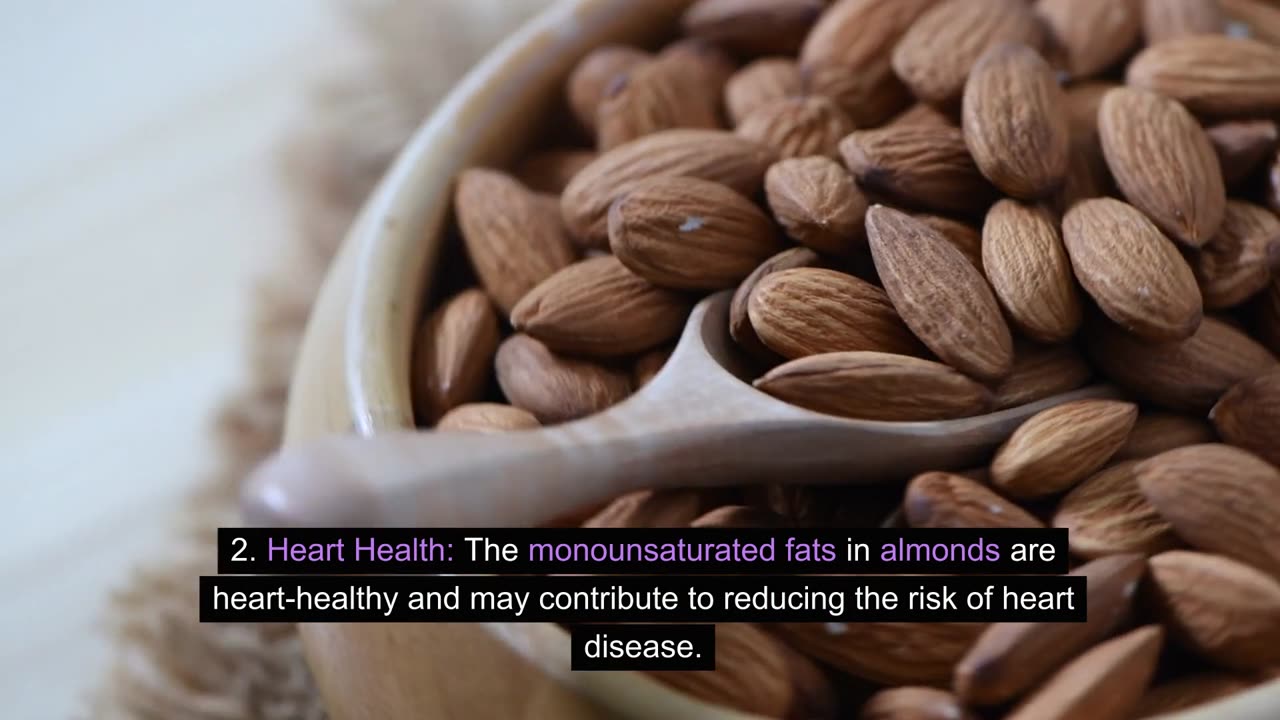Premium Only Content

Things you may not know about Almonds
Almonds: Ingredients and Nutritional Composition:
Ingredients:
Almonds are the seeds of the fruit of the almond tree (Prunus dulcis). They are typically sold as shelled, whole nuts or sliced, chopped, or ground. Almonds can be consumed raw, roasted, or in various processed forms such as almond butter or almond flour.
Nutritional Composition (per 1 ounce, approximately 28 grams):
Calories: 160
Protein: 6 grams
Fat: 14 grams (of which 9 grams are monounsaturated fats)
Carbohydrates: 6 grams
Dietary Fiber: 3.5 grams
Sugars: 1 gram
Vitamin E: 7.3 mg (37% of the daily recommended intake)
Magnesium: 76 mg (19% of the daily recommended intake)
Calcium: 76 mg (8% of the daily recommended intake)
Iron: 1 mg (6% of the daily recommended intake)
Health Pros:
Nutrient-Rich: Almonds are a good source of several essential nutrients, including vitamin E, magnesium, and calcium.
Heart Health: The monounsaturated fats in almonds are heart-healthy and may contribute to reducing the risk of heart disease.
Weight Management: Despite their relatively high-calorie content, almonds have been associated with weight management due to their satiating effect.
Antioxidants: Almonds contain antioxidants, such as vitamin E, which help protect cells from oxidative damage.
Blood Sugar Control: Some studies suggest that almonds may help regulate blood sugar levels, making them a suitable snack for individuals with diabetes.
Health Cons:
Caloric Density: While almonds offer many health benefits, they are calorie-dense, and excessive consumption may contribute to weight gain if not accounted for in the overall diet.
Phytic Acid: Almonds contain phytic acid, an anti-nutrient that can bind to minerals and reduce their absorption. Soaking or roasting almonds can help mitigate this.
Allergies: Some people may be allergic to almonds, leading to symptoms ranging from mild to severe. It's crucial to be aware of potential allergies.
Oxalates: Almonds contain oxalates, which can contribute to the formation of kidney stones in susceptible individuals.
Facts:
Versatility: Almonds are highly versatile and can be enjoyed in various forms, including whole, sliced, chopped, ground, or as almond milk, almond butter, and almond flour.
Sustainable Agriculture: Almond trees are relatively drought-tolerant, but almond cultivation has faced criticism for water usage in water-scarce regions. Efforts are being made to improve sustainability practices in the almond industry.
Culinary Use: Almonds are a common ingredient in both sweet and savory dishes, salads, and desserts, adding texture and flavor.
Ancient History: Almonds have a rich history, dating back thousands of years, with evidence of their consumption in ancient civilizations like Egypt and Greece.
Monounsaturated Fats: The monounsaturated fats in almonds are considered heart-healthy and may contribute to reducing LDL cholesterol levels.
It's essential to include a variety of foods in a balanced diet and consult with a healthcare professional or nutritionist for personalized dietary advice.
-
 2:58:21
2:58:21
xBuRnTx
9 hours ago1st Warzone Stream Online
46.7K2 -
 6:10:21
6:10:21
JdaDelete
1 day ago $8.31 earnedDino Crisis - Sega Saturday
89K4 -
 23:22
23:22
MYLUNCHBREAK CHANNEL PAGE
1 day agoUnder The Necropolis - Pt 5
86.7K33 -
 2:26:11
2:26:11
Jewels Jones Live ®
2 days agoWINNING BIGLY | A Political Rendezvous - Ep. 108
146K44 -
 2:04:49
2:04:49
Bare Knuckle Fighting Championship
4 days agoBKFC FIGHT NIGHT MOHEGAN SUN FREE FIGHTS
74.3K7 -
 25:09
25:09
BlackDiamondGunsandGear
12 hours agoYou NEED to be Training For Whats to Come
51.2K11 -
 20:03
20:03
Sideserf Cake Studio
18 hours ago $1.76 earnedA HUNGRY HUNGRY HIPPOS CAKE THAT ACTUALLY WORKS?
46.5K14 -
 23:51
23:51
marcushouse
19 hours ago $1.60 earnedStarship’s Next Move Is Coming Sooner Than You Think!
35K6 -
 22:24
22:24
The Finance Hub
1 day ago $10.99 earnedBREAKING: JOE ROGAN JUST DROPPED A MASSIVE BOMBSHELL!!!
36.6K36 -
 55:02
55:02
PMG
15 hours ago $0.94 earnedHannah Faulkner and Miriam Shaw | Moms on A Mission
25.4K1